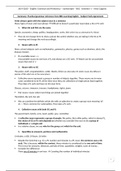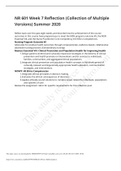Samenvatting
Samenvatting Subject-Verb Agreement (BBC learning English)
- Instelling
- Universiteit Antwerpen (UA)
Samenvatting bij 'Practical reference from BBC learning English: Subject-Verb Agreement 1 2 3) - Vak English: Grammar & Proficiency - UAntwerpen - Toegepaste Taalkunde - Bachelor 2 - Semester 1 - Anna Gagiano
[Meer zien]






